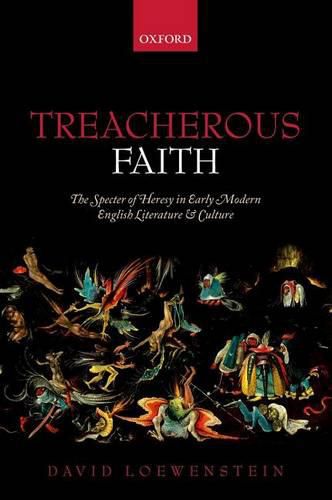Readings Newsletter
Become a Readings Member to make your shopping experience even easier.
Sign in or sign up for free!
You’re not far away from qualifying for FREE standard shipping within Australia
You’ve qualified for FREE standard shipping within Australia
The cart is loading…






Treacherous Faith offers a new and ambitious cross-disciplinary account of the ways writers from the early English Reformation to the Restoration generated, sustained, or questioned cultural anxieties about heresy and heretics. This book examines the dark, often brutal story of defining, constructing, and punishing heretics in early modern England, and especially the ways writers themselves contributed to or interrogated the politics of religious fear-mongering and demonizing. It illuminates the terrors and anxieties early modern writers articulated and the fantasies they constructed about pernicious heretics and pestilent heresies in response to the Reformation’s shattering of Western Christendom. Treacherous Faith analyzes early modern writers who contributed to cultural fears about the contagion of heresy and engaged in the making of heretics, as well as writers who challenged the constructions of heretics and the culture of religious fear-mongering. The responses of early modern writers in English to the specter of heresy and the making of heretics were varied, complex, and contradictory, depending on their religious and political alignments. Some writers (for example, Thomas More, Richard Bancroft, and Thomas Edwards) used their rhetorical resourcefulness and inventiveness to contribute to the politics of heresy-making and the specter of cunning, diabolical heretics ravaging the Church, the state, and thousands of souls; others (for example, John Foxe) questioned within certain cultural limitations heresy-making processes and the violence and savagery that religious demonizing provoked; and some writers (for example, Anne Askew, John Milton, and William Walwyn) interrogated with great daring and inventiveness the politics of religious demonizing, heresy-making, and the cultural constructions of heretics. Treacherous Faith examines the complexities and paradoxes of the heresy-making imagination in early modern England: the dark fantasies, anxieties, terrors, and violence it was capable of generating, but also the ways the dreaded specter of heresy could stimulate the literary creativity of early modern authors engaging with it from diverse religious and political perspectives. Treacherous Faith is a major interdisciplinary study of the ways the literary imagination, religious fears, and demonizing interacted in the early modern world. This study of the early modern specter of heresy contributes to work in the humanities seeking to illuminate the changing dynamics of religious fear, the rhetoric of religious demonization, and the powerful ways the literary imagination represents and constructs religious difference.
$9.00 standard shipping within Australia
FREE standard shipping within Australia for orders over $100.00
Express & International shipping calculated at checkout
Treacherous Faith offers a new and ambitious cross-disciplinary account of the ways writers from the early English Reformation to the Restoration generated, sustained, or questioned cultural anxieties about heresy and heretics. This book examines the dark, often brutal story of defining, constructing, and punishing heretics in early modern England, and especially the ways writers themselves contributed to or interrogated the politics of religious fear-mongering and demonizing. It illuminates the terrors and anxieties early modern writers articulated and the fantasies they constructed about pernicious heretics and pestilent heresies in response to the Reformation’s shattering of Western Christendom. Treacherous Faith analyzes early modern writers who contributed to cultural fears about the contagion of heresy and engaged in the making of heretics, as well as writers who challenged the constructions of heretics and the culture of religious fear-mongering. The responses of early modern writers in English to the specter of heresy and the making of heretics were varied, complex, and contradictory, depending on their religious and political alignments. Some writers (for example, Thomas More, Richard Bancroft, and Thomas Edwards) used their rhetorical resourcefulness and inventiveness to contribute to the politics of heresy-making and the specter of cunning, diabolical heretics ravaging the Church, the state, and thousands of souls; others (for example, John Foxe) questioned within certain cultural limitations heresy-making processes and the violence and savagery that religious demonizing provoked; and some writers (for example, Anne Askew, John Milton, and William Walwyn) interrogated with great daring and inventiveness the politics of religious demonizing, heresy-making, and the cultural constructions of heretics. Treacherous Faith examines the complexities and paradoxes of the heresy-making imagination in early modern England: the dark fantasies, anxieties, terrors, and violence it was capable of generating, but also the ways the dreaded specter of heresy could stimulate the literary creativity of early modern authors engaging with it from diverse religious and political perspectives. Treacherous Faith is a major interdisciplinary study of the ways the literary imagination, religious fears, and demonizing interacted in the early modern world. This study of the early modern specter of heresy contributes to work in the humanities seeking to illuminate the changing dynamics of religious fear, the rhetoric of religious demonization, and the powerful ways the literary imagination represents and constructs religious difference.